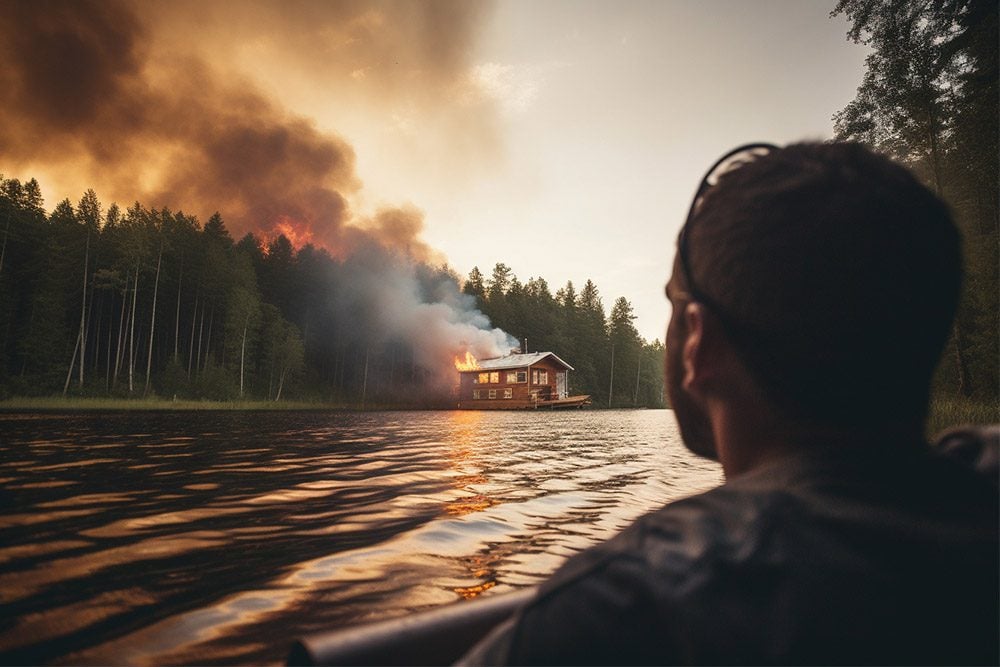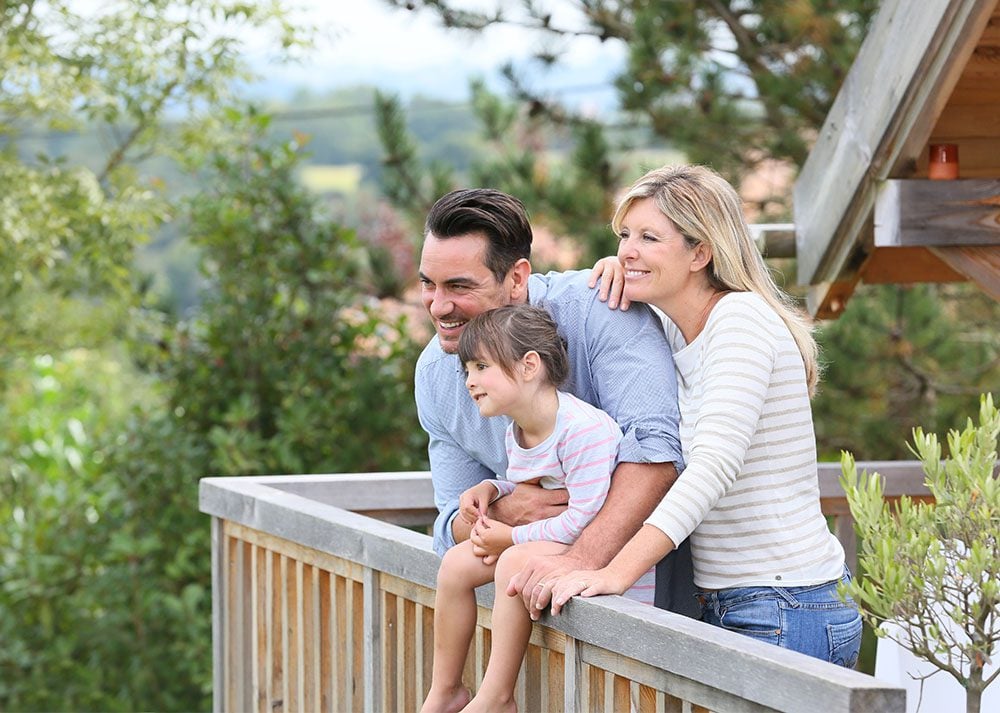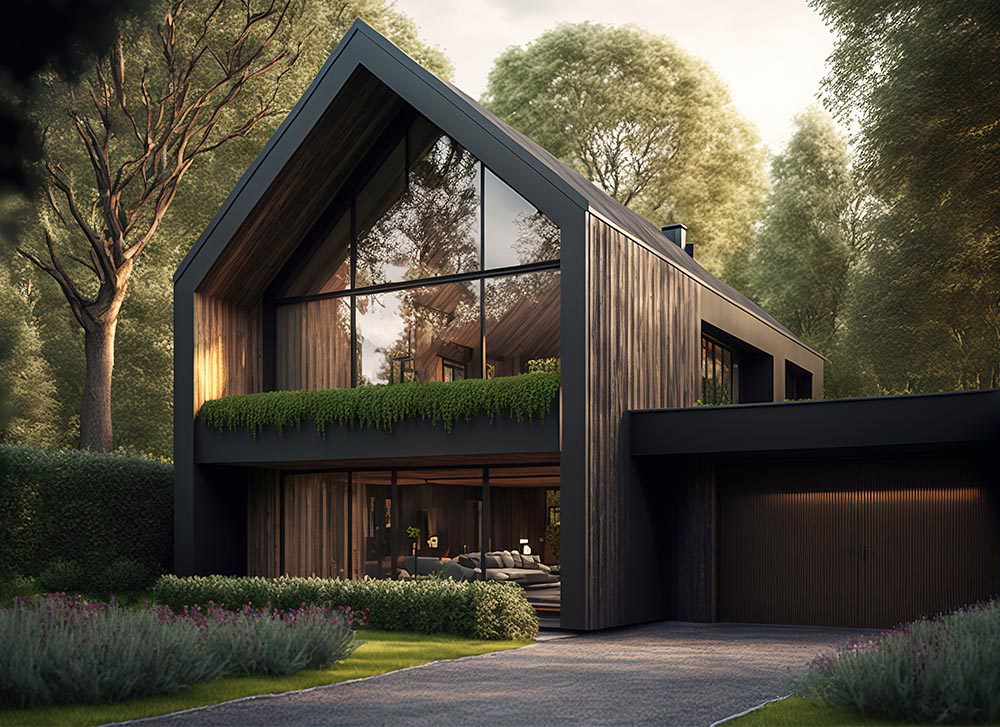4 Factors That Affect the Cost of Seasonal Camp Insurance
May 3rd, 2023
6 min read

Whether purchasing a rustic camp along West Branch Fish Creek in Oswego County or a Tug Hill cabin near Salmon River, investing in a home away from home can be an exhilarating experience. But you shouldn’t overlook the practical aspects that come with owning a second property.
One major consideration is obtaining the right insurance coverage for your camp, especially given that information about camp insurance and associated costs can be scarce.
In this article, we provide insights on unexpected factors that could influence the cost of your camp insurance policy, such as proximity to a fire station, cost of rebuilding, prior claims histories, and flood insurance requirements.
Furthermore, we’ll share strategies for reducing expenses without compromising coverage, like adjusting your policy’s deductible, implementing safety features, and exploring bundling options. Armed with this knowledge, you’ll be well-equipped to navigate through the often-overlooked world of camp insurance and make informed decisions to protect your treasured second home.
We have ample experience in writing insurance policies for camps and seasonal homes throughout the Central New York region and beyond, and we’re well-versed in the various factors that can affect the cost of coverage. With our expert guidance, camp owners have obtained policies with fair pricing, reducing unexpected expenses.
We can do the same for you.
We understand that finding the right insurance for your camp can be challenging and confusing. You want to protect your investment and enjoy your getaway without worrying about unexpected costs or risks. That’s why we’re here to help you.
By reading this article, you’ll gain valuable insights on how to get the best coverage for your camp at a reasonable price. You’ll also learn how to avoid common obstacles that could increase your insurance costs or leave you underinsured.
How to Avoid Unexpected Costs in Seasonal Camp Insurance
For many, the thrill of acquiring a seasonal home, like a rural CNY camp, is so immense that they might overlook some less exhilarating aspects of this new adventure. The fact that you’re reading this article suggests you’re making an effort to balance the excitement with practical considerations. Good for you!
One practical aspect of purchasing a seasonal property is obtaining the necessary insurance coverage. However, insurance for a second home can be quite elusive. There’s limited advertising regarding seasonal home insurance and even less information on the associated costs.
Although we provided some guidance in our article on the critical coverages to protect your seasonal camp, we didn’t delve much into the costs.
Here are a few factors that can lead to unexpected expenses in a seasonal home insurance policy.
Factor #1. Location: Distance to the Nearest Fire Station
In our article “Navigating Insurance Challenges for Your CNY Camp: Tips and Insights for Protecting Your Dream Retreat,” we highlighted the importance of a property’s proximity to the nearest fire station.
Fires can quickly spread once a house ignites. Thus, the closer your home is to a fire station, the lower the risk. Several insurance carriers may decline to provide coverage if a property is more than ten miles from a fire station, while others won’t offer coverage if it’s more than five miles away.
This situation leads to increased costs, as the limited number of carriers willing to offer coverage will charge higher premiums. They understand your need for insurance and face minimal competition, and for that, you pay a higher rate.
Suppose you find a delightful seasonal camp in Herkimer County bordering a state forest. You fall in love with the rustic cabin and the surrounding woods overlooking a lush beaver meadow. There are hunting opportunities, brook trout teeming in nearby streams, and thousands of acres of public land waiting to be hiked.
You think it’s the perfect place to escape the city and enjoy nature.
However, when you contact your insurance agent to get a quote for the camp, you discover that it’s twelve miles from the nearest fire station. This means that most insurance carriers won’t cover it, and the ones that do will charge you a hefty premium.
You realize your dream camp is not as affordable as you thought, and you may have to look for another option.
Therefore, when considering potential seasonal camp properties, always verify the distance to the nearest fire department in order to make an informed decision.
Factor #2. Rebuilding Costs: The Purchase Price of a Property May Not Reflect Its Replacement Cost
Securing a great deal on a camp or seasonal home, like a property on Cazenovia Lake, is not an unusual occurrence. However, the cost of constructing a new home today can greatly differ from the past.
To give you a scenario, say John—who owns a boat—buys a seasonal home in Cato, New York, right on Cross Lake, for $250,000. He’s thrilled to find such a beautiful place at an affordable price because it’s near a marina with seasonal boat slips. He plans to spend summers there with his family and friends, enjoying the lake and its beautiful surroundings.
He’s got the right boat insurance, but after buying the vacation home, he finally speaks with his agent about securing seasonal home insurance. John is shocked to learn that it would cost $400,000 to rebuild the house in case of a total loss. The construction costs have gone up significantly since the Cato house was built, and the materials and labor are more expensive.
John also learns that he has to insure the camp for at least 80% of its replacement cost, which means $320,000. His premium is much higher than he expected, and he has to adjust his budget accordingly.
While securing a great deal on a seasonal home may seem like a win, this example shows how the purchase price of such a home may not reflect its true value in case of a disaster. Therefore, it’s important to consider the rebuilding costs when buying a camp or seasonal property and getting insurance for it.
Factor #3. Previous Claims: Both Your Personal Claims and Those of the Camp
 Did you experience a sump pump backup in the last five years? Or perhaps your son accidentally left the water running, leading to the installation of brand-new hardwood floors. Accidents happen, and that’s precisely why our agency is here to help and support you!
Did you experience a sump pump backup in the last five years? Or perhaps your son accidentally left the water running, leading to the installation of brand-new hardwood floors. Accidents happen, and that’s precisely why our agency is here to help and support you!
It’s crucial to understand that any home insurance claims made within the past five years will increase the cost of your coverage, regardless of the property they were made for. Contrary to popular belief, these claims remain a part of your insurance history and will appear on all insurance quotes, even for different properties like a camp.
Concerning the camp, it’s not just your personal claims history that matters. Many insurance carriers will also consider the past insurance losses associated with the specific property you bought. If previous owners made any claims on the camp in the past, those might affect your premium as well.
Keep an eye out for weather-related and system-related losses, as insurance carriers often focus on damages caused by wind or water backup. But there isn’t a public method to determine if previous or current owners have filed insurance claims.The best way to avoid surprises is to get a quote from us as soon as possible. We can access that information and share it with you to help you avoid any unexpected expenses.
Factor #4. Flood Insurance Considerations
When choosing a camp near the water, which is a common preference, determine the risk of flooding. Numerous camps across the CNY and Upstate regions have succumbed to flood damage.
Standard home insurance policies, including those for second homes, do not cover flood-related losses. And there are no adequate riders available to supplement those policies.
Therefore, it’s advisable to obtain a separate flood insurance policy. If you’re financing the camp property and any part of it lies within a designated flood zone, your lender will mandate flood insurance coverage.
A flood policy can often be two to three times more expensive than the camp’s home policy. Flood zone maps can change, and it’s not unusual for the current owner to not know if the property is in a flood zone or not. To confirm the flood risk for the camp property, you can visit the FEMA Flood Map resource before you move forward.
Tips for Lowering Your Seasonal Camp Insurance Costs
Besides finding out as much as you can ahead of time, there are some measures you can take to reduce the cost of your camp’s insurance premium without hurting your coverage. Here are some common ways:
- Opt for a higher deductible. The more you’re willing to pay out of pocket for smaller losses, the lower your premium will be. Consider looking at quotes with a deductible of $2,500 or more.
- Install some safety features. Insurance companies will often provide discounts for having smoke detectors, burglar alarms, and deadbolts. It’ll lower your insurance cost and protect your camp.
- Bundle the policies. Your home, auto, and umbrella insurer will offer discounts when adding additional policies to your account. Typically all of the policies receive a discount when another is added to the mix.
One thing to note is that bundling can be more expensive if you don’t consider other options first. It’s not uncommon for us to find a less expensive policy with a different insurance carrier compared to the bundled premium your current carrier is offering.
Secure the Right Insurance Coverage for Your Camp
As we’ve shown, camp insurance is not the same as regular home insurance. It has different coverage options, limitations, and costs. You don’t want to find out too late that your camp is underinsured or overpriced. That’s why you need to do your homework and understand what factors affect your camp insurance policy.
You’re here reading this article for that reason, so well done!
You want to spend wisely on the right insurance for your camp and avoid unexpected pitfalls that could make your policy more costly.
We want to help you do that.
Your journey toward obtaining the right insurance coverage for your camp is backed by our extensive knowledge and expertise. We’ll help you identify the critical aspects that determine the cost of your camp insurance policy and empower you with strategies to balance expenses and coverage effectively.
With our assistance, you can confidently secure the protection your second home deserves. If you’re ready to move forward, click the Get a Quote button below, and let’s begin the journey of safeguarding your home away from home with the peace of mind you seek.
Daniel is an accomplished content creator. He has been working in publishing for almost two decades. Horan Companies hired Daniel as its content manager in November 2022. The agency entrusted its messaging to him. Since then, Daniel has written insurance articles, service pages, PDF guides, and more. All in an effort to educate CNY readers. He's helping them understand the world of insurance so they can make informed decisions.
Topics:






